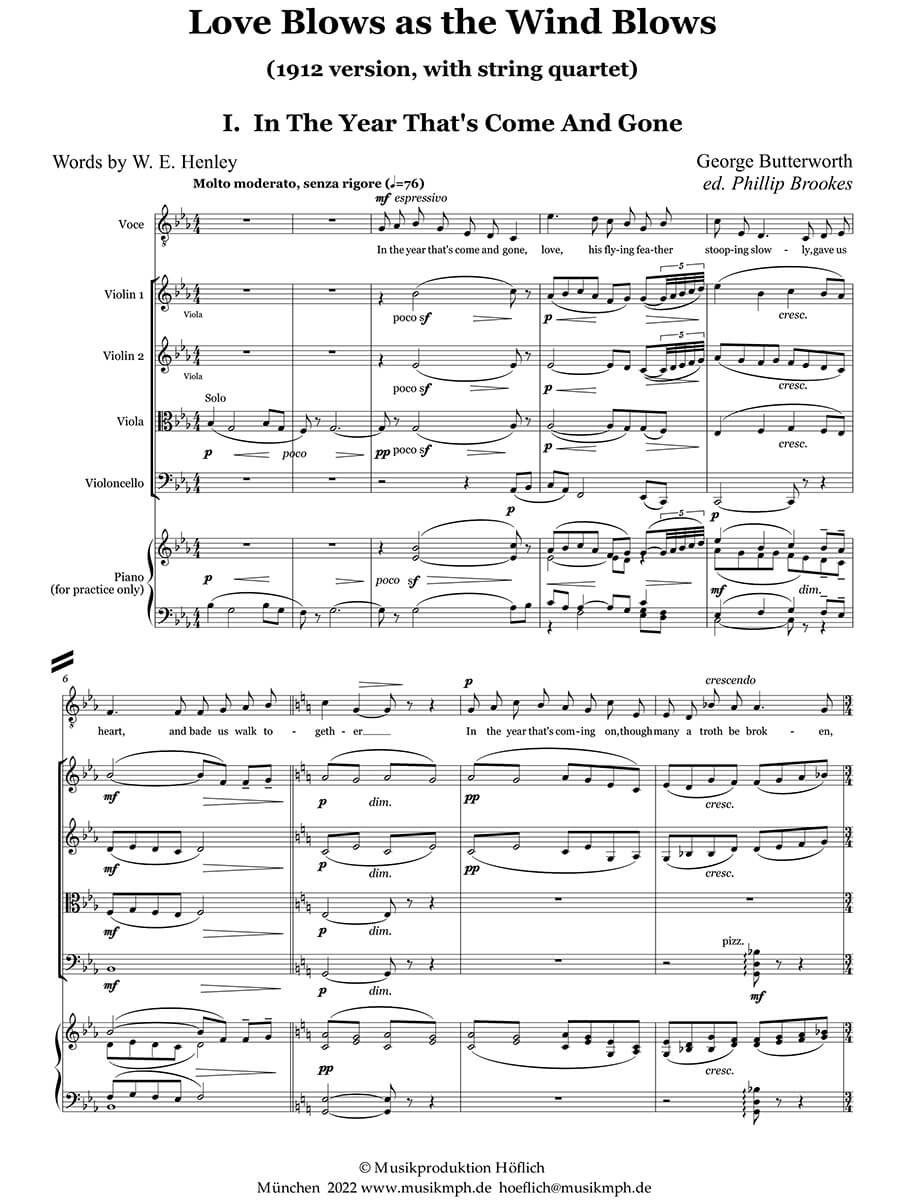Love Blows as the Wind Blows for voice & string quartet, including 2 versions: 1912 orig. version / 1914 version arr. by Phillip Brookes (new print, first print)
Butterworth, George
30,00 €
Preface
George Sainton Kaye Butterworth – Love Blows as the Wind Blows for voice & string quartet
(b. London, 12 July 1885; d. Pozières, 5 August 1916)
Original version (1911-1912) for voice & string quartet, and
Revised version (1914) arr. by Phillip Brookes for voice & string quartet
Preface
A genuine song cycle, this is something of a mystery because we have no idea of its genesis. It certainly began as a work for voice and string quartet. It seems that it was Ralph Vaughan Williams who made the piano arrangement for the 1922 first publication, but Butterworth also revised it and scored it for voice and small orchestra in 1914, reducing the number of songs to three. In this form it was his last completed work.
Butterworth greatly admired his older friend’s song cycle On Wenlock Edge for voice, piano and string quartet (which dated from 1909, almost the first thing Vaughan Williams completed after studying with Ravel). Perhaps it was this that stimulated the younger man to set some late Victorian verses by W. E. Henley. The autograph of the original string quartet version is dated 1911-12, one of several pieces he began after his mother’s death, but no record of any performance survives before that of June 3rd 1918 at the Royal College of Music, when student Frederick Grisewood sang three of the songs with the English String Quartet (they omitted Fill a glass with golden wine). Grisewood – better known as ‘Freddie’ – was to become the most famous BBC Radio presenter during the wars, and the first person to host a radio quiz show!
The cycle has a unifying idée fixe that occurs at the beginning and end, and in one other song. The voice enters immediately with a lyrical phrase in a conversational style that anticipates that of Gerald Finzi (1901-1956). Part of the attraction lies in the ambiguity of the song’s phrasing. It is hard to believe that Finzi did not know this cycle from the 1920s – there were several performances, such as ones by a quartet that included Rebecca Clarke and May Muckle.
Butterworth was a composer who liked to ‘tinker’ with his music and the examples we have consistently suggest he had a fine ear for what might work better. When he revised the cycle in 1914 he omitted Fill A Glass With Golden Wine and rewrote Life In Her Creaking Shoes so as to run directly into the last song. The five-note figure that begins On the way to Kew establishes an almost minimalist atmosphere around triads in root position that give a mesmerising effect that clearly represents the ever-flowing Thames. It has its roots in a figure that appeared in the opening song (at “rich with joy and sorrow, we shall light our lamp and wait”). There may well be a deeply personal side to this cycle – especially in its revised three-song format. The first poem celebrates memories of love in a changing world that will continue beyond life. The second recognises the fragility of love amid the uncertainties of ever-changing events, as well as introducing the dual images of a flowing river and a ghost. And the last song, set against the flowing river, tells of meeting a ghost whose existence lightens the poet’s heart because – presumably – it affords reassurance that he is not left entirely alone (“not in vain, not in vain shall I look for you again, coming up from Richmond on the way to Kew”). Butterworth surely had his mother’s loss in mind.
For the orchestral revision Butterworth altered the vocal line quite extensively in places; some of this entailed redrafting the accompaniment so that it is not possible simply to replace the one with the other. This is a pity, since the later version is generally an improvement. The 1914 version included here is based on the orchestral one, but arranged for the original forces of voice & string quartet. The original 1914 version for voice & orchestra is included already in MPH score 623, and performance materials for that are already available.
Phillip Brookes, 2022
For performance material please contact Musikproduktion Höflich (www.musikmph.de), Munich.
Vorwort Deutsch lesen> HERE
Score Data
| Special Edition | The Phillip Brookes Collection |
|---|---|
| Genre | Chamber Music |
| Size | 225 x 320 mm |
| Performance Materials | available |
| Printing | New print / First print |
